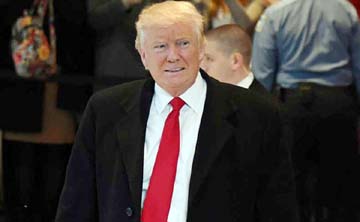
PTI, Beijing :
The Indo-US relations will become an important part of President-elect Donald Trump’s diplomacy to “suppress” China, but it will have limited impact on Beijing as New Delhi may not accept a “quasi-alliance” with Washington to retain its independent foreign policy, the Chinese state media commented today.
“US-Indian relations will become an important part of Trump’s diplomacy. With the purpose of stabilising the external situation and straightening out problems at home, the Trump administration will seek an improving relationship with India,” an article in the state-run Global Times said today.
“However, due to its own domestic problems, India can only play a limited role in assisting the US in solving headaches, thus the Trump administration will not put US-Indian relations in a very important position, and its enthusiasm for building a quasi-alliance with India will decrease,” it said.
“As a global power sticking to non-alignment diplomacy, India probably will not set a goal of allying with the US in suppressing China as the US hopes,” the article said, assessing policies options for Trump after he takes over the Presidency next month said.
“Therefore, there are unbridgeable differences between American intentions for developing a close relationship with India to balance China and India’s concept of developing independent diplomacy toward the US and China,” the article titled ‘Trump may be cool to alliance with Delhi’ said.
“In other words, the US attempts of establishing a quasi-alliance with India to restrict China may not be accepted by India as the country owns an independent diplomatic tradition,” it said.
When dealing with global challenges such as climate change, nuclear proliferation and terrorism, the US may require India to make greater contributions to specific fields which only the US is concerned about, it said.
“His will reduce India’s trust in the US, and weaken the basis for deepening bilateral cooperation to the level the US looks forward to,” it said.
“To sum up, US-Indian relations during Trump’s term will have a limited impact on China. The intensive US-India security cooperation during the Obama administration will be changed due to Trump’s adjustment in diplomacy, easing off the pressure on China,” it said.
“Besides, the prospect of US-Indian cooperation in trade is not optimistic, and it will only exert a limited effect on China’s influence on regional trade,” it said. Chinese official media began attacking Trump after his tweets yesterday questioning for the first time after his election, China’s currency devaluation and the Beijing’s claims on South China Sea.
AP adds: Whether by accident or design, President-elect Donald Trump is signaling a tougher American policy toward China, sparking warnings from both the outgoing Obama administration and Beijing.
On Monday, White House spokesman Josh Earnest said progress with the Chinese could be “undermined” by a flare-up over the sovereignty of Taiwan, the self-governing island the US broke diplomatic ties with in 1979. That split was part of an agreement with China, which claims the island as its own territory, although the U.S. continues to sell Taiwan billions in military equipment and has other economic ties.
Trump broke protocol last week by speaking with Taiwanese President Tsai Ing-wen, then took to Twitter to challenge China’s trade and military policies.
“It’s unclear exactly what the strategic effort is,” Earnest said. “I’ll leave that to them to explain.”
So far, Trump’s advisers have struggled to explain his action, sending mixed messages about whether the conversation with Taiwan’s leader was a step toward a new policy or simply a congratulatory call. Incoming White House chief of staff Reince Priebus said Trump “knew exactly what was happening” when he spoke with Tsai, but Vice President-elect Mike Pence described the interaction as “nothing more than taking a courtesy call of congratulations.”
Trump has pledged to be more “unpredictable” on the world stage, billing the approach as a much-needed change from President Barack Obama’s deliberative style and public forecasting about U.S. policy. But Trump’s unpredictability is likely to unnerve both allies and adversaries, leaving glaring questions about whether the foreign policy novice is carrying out planned strategies or acting on impulse.
China’s authoritarian government likes predictability in its dealings with other nations, particularly the United States. The US and China are the world’s two largest economies with bilateral trade in goods and services reaching nearly $660 billion last year.
While there have been sharp differences between Beijing and Washington on China’s island building in the South China Sea and over alleged Chinese cybertheft of US commercial secrets, the two powers have cooperated effectively on climate change and the Iran nuclear deal.
Taiwan split from the Chinese mainland in 1949. American policy acknowledges the Chinese view that it has sovereignty over Taiwan, yet the U.S. considers Taiwan’s status as unsettled. The US is Taiwan’s main source of weapons, with $14 billion in approved arms sales since 2009.
US diplomats were shocked by Trump’s telephone call with the Taiwanese leader. Several officials privately expressed deep unease that Trump’s team did not inform the administration in advance or give it a chance to provide input.
Max Baucus, the US ambassador to China, spoke about the matter Saturday with China’s vice foreign minister to reiterate America’s one-China policy on behalf of the current administration.
Chinese Foreign Ministry spokesman Lu Kang said Monday that China would have “no comment on what motivated the Trump team” to make the tweets, and he said he believed both sides would continue to support a “sound and a stable bilateral relationship.”

